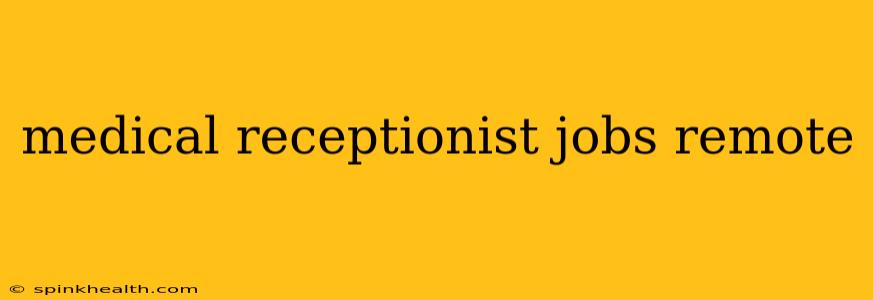The hum of the office, the constant ringing of the phone – these were once the hallmarks of a medical receptionist's day. But the world has changed, and with it, the landscape of healthcare careers. The rise of telehealth and the increasing demand for flexible work arrangements have ushered in a new era, creating a surprising number of remote medical receptionist jobs. This isn't just a temporary trend; it's a fundamental shift in how healthcare operates, offering exciting opportunities for those seeking work-life balance and career flexibility.
My own journey into the world of remote work began unexpectedly. I was a seasoned medical receptionist, accustomed to the hustle and bustle of a busy clinic. The transition to a remote position felt daunting at first, but the benefits quickly outweighed any initial anxieties. This story isn't just about me; it's about the growing number of people discovering the rewarding and surprisingly fulfilling nature of these roles.
What Does a Remote Medical Receptionist Do?
Contrary to popular belief, a remote medical receptionist isn't just answering phones. The role is multifaceted and demands a diverse skill set. Let's delve deeper:
Managing Appointments and Scheduling:
This is the core of the job. Using specialized software, you'll schedule patient appointments, manage waiting lists, and ensure smooth workflow for the medical practice. This often involves confirming appointments, rescheduling, and communicating with patients about any changes. Think of it as the smooth-running engine of the entire medical practice, kept humming along by your careful orchestration.
Handling Patient Inquiries:
Whether it’s answering phones, responding to emails, or managing online communication channels, a key part of the job is ensuring patients receive timely and accurate information about appointments, billing, insurance, and general practice details. Empathy and effective communication are essential here, transforming sometimes stressful situations into positive interactions.
Insurance Verification and Billing:
Many remote positions involve verifying insurance coverage, processing claims, and ensuring accurate billing procedures. This requires attention to detail and a thorough understanding of medical billing practices. This is where precision and accuracy are paramount, ensuring both the practice and the patient are taken care of properly.
Medical Record Management:
Depending on the practice and your specific responsibilities, you may also be involved in maintaining patient medical records, updating information, and ensuring confidentiality. This often involves using electronic health record (EHR) systems, requiring proficiency in digital record-keeping.
Frequently Asked Questions about Remote Medical Receptionist Jobs
Now let's tackle some of the most common questions surrounding this evolving career path:
What qualifications are needed for a remote medical receptionist job?
While specific requirements vary, most employers seek candidates with a high school diploma or equivalent, prior experience as a medical receptionist, strong computer skills, and a proven ability to handle sensitive information. Excellent communication and organizational skills are equally crucial.
What software or tools are typically used?
Commonly used software includes Electronic Health Record (EHR) systems (like Epic or Cerner), appointment scheduling software, and communication platforms like Slack or Zoom. Familiarity with medical billing software is often a plus.
How can I find remote medical receptionist jobs?
Online job boards (Indeed, LinkedIn, ZipRecruiter), company websites, and specialized healthcare job sites are great places to start your search. Networking within the healthcare industry can also open doors to unexpected opportunities.
Are remote medical receptionist jobs secure?
While no job is completely secure, the demand for remote healthcare services continues to grow, suggesting strong long-term potential for this career path. The flexibility and efficiency offered by remote receptionists make them valuable assets to many practices.
What are the advantages of working as a remote medical receptionist?
The benefits are numerous: flexible work hours, the ability to work from anywhere with an internet connection, reduced commuting time and costs, and a better work-life balance. This allows for a more personalized career path, tailoring the work to one's individual needs and circumstances.
The world of remote medical receptionist jobs is expanding rapidly, offering a unique blend of medical expertise and technological adaptability. It's a career path that combines the rewarding aspects of helping people with the flexibility and freedom of remote work—a perfect synergy for those seeking a fulfilling and adaptable professional journey.

